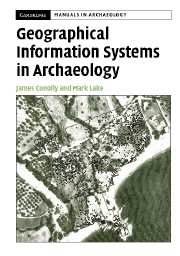Book contents
- Frontmatter
- Contents
- List of figures
- List of tables
- List of boxes
- Acknowledgements
- 1 INTRODUCTION AND THEORETICAL ISSUES IN ARCHAEOLOGICAL GIS
- 2 FIRST PRINCIPLES
- 3 PUTTING GIS TO WORK IN ARCHAEOLOGY
- 4 THE GEODATABASE
- 5 SPATIAL DATA ACQUISITION
- 6 BUILDING SURFACE MODELS
- 7 EXPLORATORY DATA ANALYSIS
- 8 SPATIAL ANALYSIS
- 9 MAP ALGEBRA, SURFACE DERIVATIVES AND SPATIAL PROCESSES
- 10 REGIONS: TERRITORIES, CATCHMENTS AND VIEWSHEDS
- 11 ROUTES: NETWORKS, COST PATHS AND HYDROLOGY
- 12 MAPS AND DIGITAL CARTOGRAPHY
- 13 MAINTAINING SPATIAL DATA
- Glossary
- References
- Index
11 - ROUTES: NETWORKS, COST PATHS AND HYDROLOGY
Published online by Cambridge University Press: 05 June 2012
- Frontmatter
- Contents
- List of figures
- List of tables
- List of boxes
- Acknowledgements
- 1 INTRODUCTION AND THEORETICAL ISSUES IN ARCHAEOLOGICAL GIS
- 2 FIRST PRINCIPLES
- 3 PUTTING GIS TO WORK IN ARCHAEOLOGY
- 4 THE GEODATABASE
- 5 SPATIAL DATA ACQUISITION
- 6 BUILDING SURFACE MODELS
- 7 EXPLORATORY DATA ANALYSIS
- 8 SPATIAL ANALYSIS
- 9 MAP ALGEBRA, SURFACE DERIVATIVES AND SPATIAL PROCESSES
- 10 REGIONS: TERRITORIES, CATCHMENTS AND VIEWSHEDS
- 11 ROUTES: NETWORKS, COST PATHS AND HYDROLOGY
- 12 MAPS AND DIGITAL CARTOGRAPHY
- 13 MAINTAINING SPATIAL DATA
- Glossary
- References
- Index
Summary
Introduction
It is often appropriate to model the spatial organisation of human activity in terms of point locations and the relationships between them; for example the movement of goods between settlements or the intervisibility between forts. This chapter discusses the various network analysis tools that can be used to study such relationships. It also discusses techniques for predicting the likely path of an unknown route between point locations, as well as the flow of water and watersheds.
Given that the bulk of archaeological data is ultimately point based it is surprising that network analysis has not featured more prominently in the archaeological application of GIS. Of course, what is a point at one scale of analysis may be a region at another, and it is thus important to recognise that the applicability of network analysis is determined by the way in which the problem is framed rather than the geographical extent of a particular study. A few published archaeological network analyses have investigated subjects ranging in scale from the colonisation of new territory (Allen 1990; Zubrow 1990) and the location of ‘centres’ (Bell and Church 1985; Mackie 2001) to the connectivity of rooms in individual buildings (Foster 1989). There is no reason why this range could not be extended to even smaller extents: to, for example, investigate patterns of refitting among lithic artefacts in a single stratigraphic unit.
- Type
- Chapter
- Information
- Geographical Information Systems in Archaeology , pp. 234 - 262Publisher: Cambridge University PressPrint publication year: 2006
- 1
- Cited by

